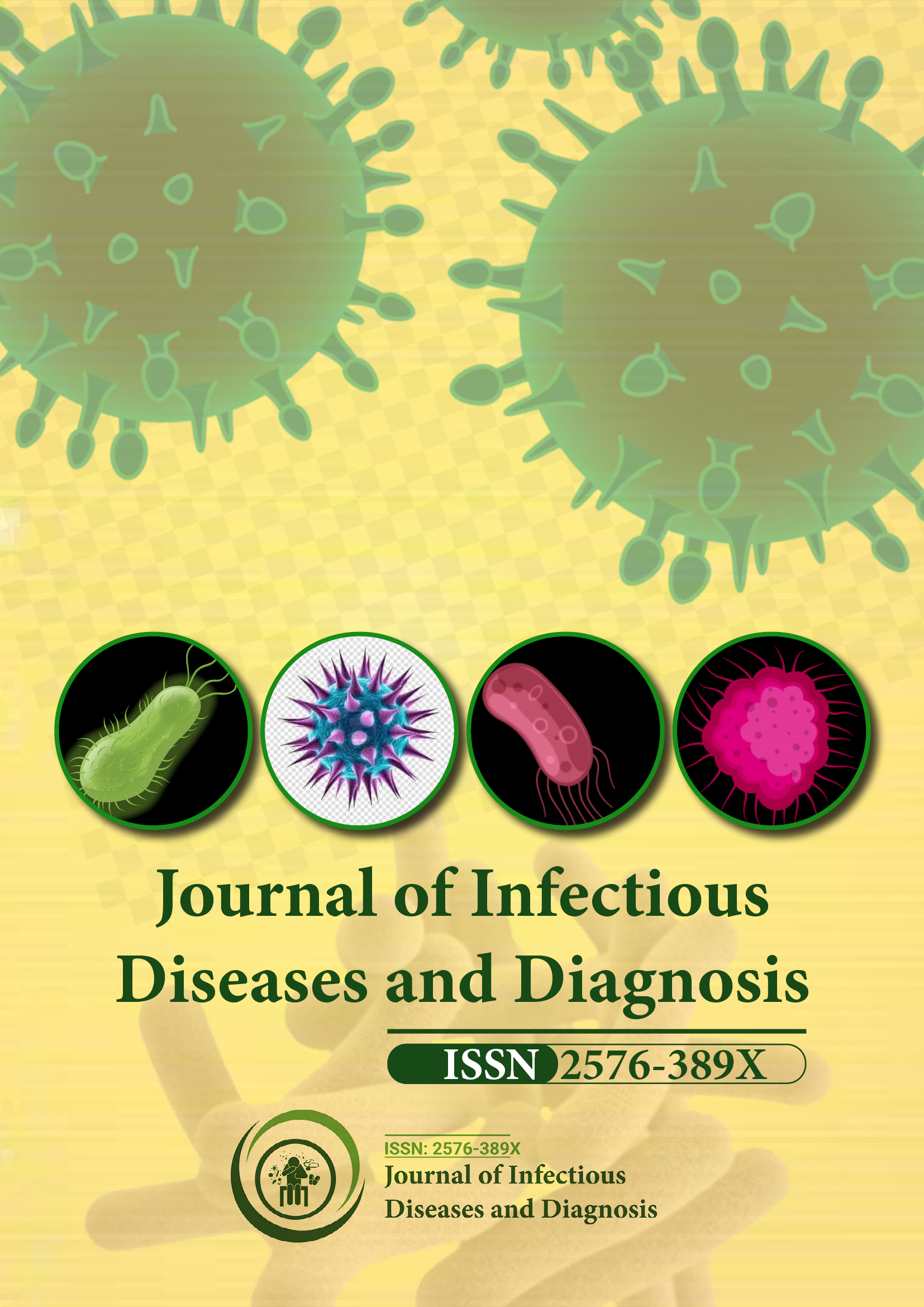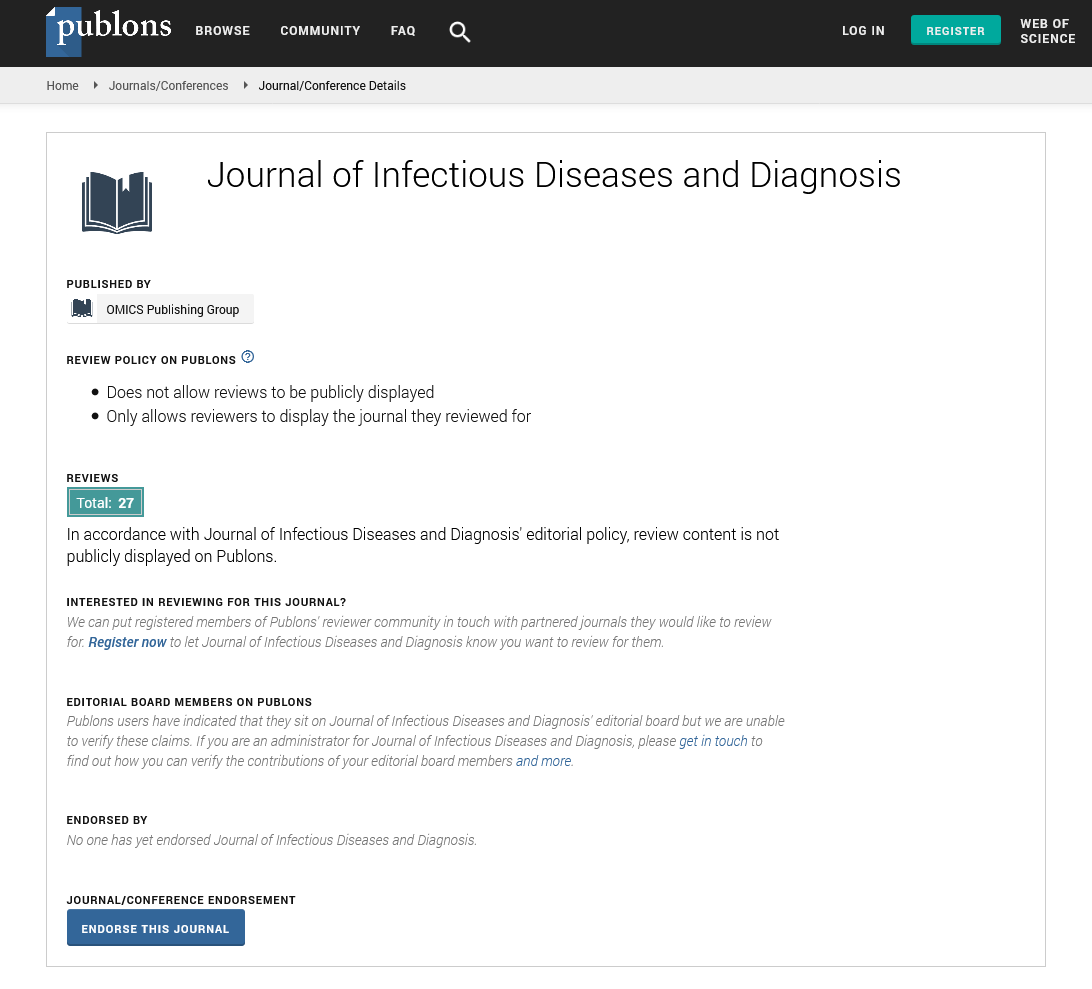Indexed In
- RefSeek
- Hamdard University
- EBSCO A-Z
- Publons
- Euro Pub
- Google Scholar
Useful Links
Share This Page
Journal Flyer

Open Access Journals
- Agri and Aquaculture
- Biochemistry
- Bioinformatics & Systems Biology
- Business & Management
- Chemistry
- Clinical Sciences
- Engineering
- Food & Nutrition
- General Science
- Genetics & Molecular Biology
- Immunology & Microbiology
- Medical Sciences
- Neuroscience & Psychology
- Nursing & Health Care
- Pharmaceutical Sciences
Short Communication - (2023) Volume 8, Issue 2
Exploring the Impact of Gut Microbiota on the Development and Progression of Infectious Diseases
Jonas Bjork*Received: 01-Mar-2023, Manuscript No. JIDD-23-20783; Editor assigned: 03-Mar-2023, Pre QC No. JIDD-23-20783 (QC); Reviewed: 17-Mar-2023, QC No. JIDD-23-20783; Revised: 24-Mar-2023, Manuscript No. JIDD-23-20783 (R); Published: 31-Mar-2023, DOI: 10.35248/2576-389X.23.08.202
About the Study
The gut microbiota is a complex community of microorganisms that reside in the gastrointestinal tract. These microorganisms play a crucial role in maintaining the host's health by regulating various physiological processes such as digestion, nutrient absorption, and immune function. Recent research has shown that the gut microbiota also plays a critical role in the prevention and treatment of infectious diseases. In this article, we will discuss the role of gut microbiota in infectious diseases [1-3].
Infectious diseases are caused by the invasion and multiplication of pathogenic microorganisms in the host. The human gastrointestinal tract is constantly exposed to a wide range of microorganisms, including pathogens. The gut microbiota plays a crucial role in protecting the host from pathogenic infections by competing for nutrients and resources with pathogenic microorganisms, secreting antimicrobial compounds, and modulating the host's immune response.
One of the primary mechanisms by which the gut microbiota protects the host from infections is by competing for nutrients and resources with pathogenic microorganisms [4-5]. The gut microbiota utilizes nutrients from the host's diet, preventing the growth and proliferation of pathogenic microorganisms. Additionally, the gut microbiota produces Short-Chain Fatty Acids (SCFAs) that are essential for the maintenance of gut health. SCFAs promote the growth of beneficial bacteria, maintain gut integrity, and suppress the growth of pathogenic bacteria.
The gut microbiota also secretes antimicrobial compounds that directly inhibit the growth of pathogenic microorganisms. These compounds include bacteriocins, lysozyme, and lactoferrin. Bacteriocins are peptides that are produced by certain bacteria and are toxic to other bacteria. Lysozyme is an enzyme that breaks down the cell walls of bacteria, while lactoferrin binds to iron and prevents its use by pathogenic microorganisms [6].
In addition to its direct antimicrobial effects, the gut microbiota also modulates the host's immune response to prevent infections. The gut microbiota stimulates the production of Immunoglobulin A (IgA), which is an antibody that plays a crucial role in the mucosal immune response. IgA neutralizes pathogenic microorganisms and prevents their colonization in the gut. The gut microbiota also stimulates the production of regulatory T cells, which suppress the immune response and prevent excessive inflammation in response to pathogenic infections [7-8].
The gut microbiota has been shown to play a critical role in the prevention and treatment of various infectious diseases. For example, several studies have shown that the gut microbiota plays a crucial role in preventing Clostridium difficile Infection (CDI). CDI is a severe infection that is characterized by diarrhea, abdominal pain, and fever. CDI is typically treated with antibiotics, which can disrupt the gut microbiota and lead to the overgrowth of C. difficile. The gut microbiota competes with C. difficile for nutrients and resources, preventing its overgrowth [9]. Additionally, the gut microbiota produces antimicrobial compounds that directly inhibit the growth of C. difficile. Several studies have shown that Fecal Microbiota Transplantation (FMT), which involves transferring fecal material from a healthy donor to a CDI patient, is an effective treatment for CDI. FMT restores the gut microbiota diversity and function, leading to the resolution of CDI symptoms.
The gut microbiota also plays a critical role in the prevention and treatment of viral infections. For example, several studies have shown that the gut microbiota modulates the host's immune response to prevent the overgrowth of Respiratory Syncytial Virus (RSV), a common viral pathogen that causes respiratory infections in infants and young children [10]. The gut microbiota stimulates the production of type I interferon, which are essential for the antiviral immune response.
Conclusion
In conclusion, EIDs are a growing global health concern that poses a significant threat to human, animal and environmental health. Effective strategies are needed to address this threat, including strengthening surveillance systems, improving laboratory capacity, enhancing research and development, strengthening international cooperation, and engaging communities and the private sector. Addressing the threat from EIDs requires a multi-faceted and integrated approach, involving the collaboration of multiple sectors and stakeholders.
References
- Wang C, Xu J, Yang L. Prevalence and risk factors of chronic obstructive pulmonary disease in China (the China Pulmonary Health [CPH]study): A national cross-sectional study. Lancet 2018;39l(2):1706-1717.
[Crossref] [Google Scholar] [PubMed]
- Mathers CD, Loncar D. Projections of global mortality and burden of disease from 2002 to 2030. PLoS Med. 2006;3(11):e442.
[Crossref] [Google Scholar] [PubMed]
- BR Celli, W MacNee. Standards for the diagnosis and treatment of patients with COPD: a summary of the ATS/ERS position paper. Eur Respir J. 2004;23(6):932-946.
[Crossref] [Google Scholar] [PubMed]
- Sebastiao CS, Morais J, Brito M. Factor’s influencing HIV drug resistance among pregnant women in Luanda, Angola: Findings from a cross-sectional study. Trop Med Infect Dis. 2021;6(1):29.
[Crossref] [Google Scholar] [PubMed]
- Cui Z, Huang F, Liang D, Huang Y, Qin H, Ye J, et al. Tuberculosis among ambulatory people living with HIV in Guangxi Province, China: A longitudinal study. Int J Environ Res Public Health. 2022;19(19):12280.
[Crossref] [Google Scholar] [PubMed]
- Nyamogoba HDN, Mbuthia G, Mining S, Kikuvi G, Biegon R, Mpoke S, et al. HIV co-infection with tuberculous and non-tuberculous mycobacteria in western Kenya: Challenges in the diagnosis and management. Afr Health Sci. 2013;12(3):305-311.
[Crossref] [Google Scholar] [PubMed]
- Datiko DG, Yassin MA, Chekol LT, Kabeto LE, Lindtjorn B. The rate of TB-HIV co-infection depends on the prevalence of HIV infection in a community. BMC Public Health. 2008;8(1):1-8.
[Crossref] [Google Scholar] [PubMed]
- Post FA, Grint D, Werlinrud AM, Panteleev A, Riekstina V, Malashenkov EA, et al. Multi-drug-resistant tuberculosis in HIV positive patients in Eastern Europe. J Infect. 2014;68(3):259-263.
[Crossref] [Google Scholar] [PubMed]
- Cui Z, Lin M, Nie S, Lan R. Risk factors associated with Tuberculosis (TB) among people living with HIV/AIDS: A pair matched case-control study in Guangxi, China. PLoS One. 2017;12(3):1-12.
[Crossref] [Google Scholar] [PubMed]
- Corbett EL, MacPherson P. Tuberculosis screening in high human immunodeficiency virus prevalence settings: Turning promise into reality. Int J Tuberc Lung Dis. 2013;17(9):1125-1138.
[Crossref] [Google Scholar] [PubMed]
Citation: Bjork J (2023) Exploring the Impact of Gut Microbiota on the Development and Progression of Infectious Diseases. J Infect Dis Diagn. 8:202.
Copyright: © 2023 Bjork J. This is an open-access article distributed under the terms of the Creative Commons Attribution License, which permits unrestricted use, distribution, and reproduction in any medium, provided the original author and source are credited.

